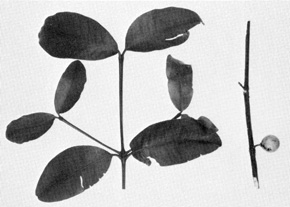|
Description: Shrub or tree to 5 m. Propagation by seed, layering, grafting. Flowers May-June (Flor-ida). Dioecious. Fruit matures in 60-90 days. Fruit ovoid, 2-2.5 cm in diameter; external color purple, internal yellow. Utilization: Pulp eaten fresh, in jellies, jams. Flavor sweet, pleasant. Useful for local food production, but little potential for commercial development. Reference: Burkill 1935. Flacourtia rukam Zoll. et Mor. Common names: rukam, Indian prune (English). Origin: Philippines, Malaya Archipelago. Distribution: Introduced elsewhere into Tropics but not common. Cultural requirements: Hot, humid tropical lowlands. Description: Tree to 7 m. Propagation by seed, graft-ing. Flowers May-June (Florida). Dioecious. Fruit matures in 60-90 days. Fruit ovoid, 2-2.5 cm in diameter; external color purple, internal yellow. Utilization: Pulp eaten fresh, in jellies, jams. Flavor sweet, pleasant. Little potential for commercial development. References: Burkill 1935, Sturrock 1959. GnetaceaeGnetum gnemon L.Common names: Spanish joint fir (English); meninjau (Malaya). Origin: Malaysia. Distribution: Tropical Asia. Cultural requirements: Hot, wet tropical climate. Description: Tree to 20 m. Propagation by seed, cut-tings. Fruit 3 cm long; exterior color yellow or red. Utilization: Fruit eaten fresh, boiled, roasted. Leaves eaten fresh. Important in native area. Much poten-tial as food crop. References: Burkill 1935, Molesworth Allen 1967. GuttiferaeGarcinia cambogia Desrouss.Common name: goraka (Sri Lanka) . Origin: Sri Lanka. Distribution: Tropical Asia. Cultural requirements: Hot, wet tropical climate. Utilization: Pulp eaten fresh, dried; used in curries. Flavor very sour. Little potential for development. |
Garcinia dulcis
Kurz Common name: mundu (Malaya). Origin: Philippines, Borneo, Java. Distribution: Introduced elsewhere into Tropics but rare. Cultural requirements: Hot, wet tropical lowlands. Description: Tree to 13 m. Propagation by seed. Fruit conical, 5-7 cm in diameter, solitary; external color pale orange, internal orange yellow. Utilization: Pulp eaten fresh, in jams, as flavoring in other foods. Flavor sour to subacid. Rich in citric acid. Potential as home garden fruit in Tropics. References: Burkill 1935, Molesworth Allen 1967. 
Figure 19. Garcinia dulcis, small but delicious. Garcinia livingstonei T. Anders. Common names: imbe (English); imbe (southeastern Africa). Origin: Eastern tropical Asia. Distribution: Introduced widely into Tropics but not common. Cultural requirements: Originated in hot, dry tropical climate but grows well in more humid climate also. Description: Tree to 6 m. Propagation by seed, graft-ing. Fruit production in 4-6 years from seed, 2-3 years from grafts. Flowers February-April, August-September (Florida). Dioecious. Fruit matures in 180-200 days. Fruit ellipsoid, 2.5-4 cm in diameter; external color orange, internal light orange. Utilization: Pulp eaten fresh. Flavor sweet, pleasant. Pulp scant in most selections. Little potential for development. References: Burkill 1935, Ruehle et al. 1958. |